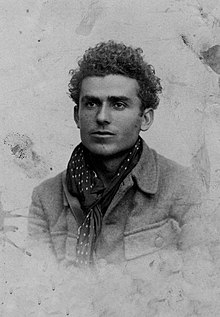Petro Marko
Petro Marko (born November 25, 1913 in Dhërmi ; † December 27, 1991 ) was an Albanian writer. He is one of the first and most important authors of modern Albanian literature . Marko can be seen as the "founding father" of modern prose in Albania and is recognized above all for his innovative ways of dealing with experiences and events as well as their description in his works.
Life
Petro Marko completed his training at a commercial school in Vlora in 1932 and began writing poetry and short stories in Tirana at the age of twenty, with the support and supervision of Ernest Koliqi . From March 1, 1936, Marko wrote for the bi-weekly magazine ABC , which was published in Tirana and was soon banned by the royal authorities of Albania . Marko can be found politically in the left spectrum and possessed revolutionary- anarchist tendencies.
He then went to Spain that same year . With about forty other Albanians , he joined the Spanish Civil War, the Garibaldi Battalion of the International Brigades in order against the fascist influenced Francoism to fight. Together with Skënder Luarasi , he published the Albanian-language magazine Vullnetari i lirisë ("Freedom Volunteer") in Madrid . The experiences that Marko gained in the Spanish Civil War form the basis for his novel Hasta la vista .
He returned to Albania in 1940 and was captured the following year by the Italian fascist regime , whose satellite state Albania was at the time, and taken to a prison on the island of Ustica in the Tyrrhenian Sea . In his novel Nata e Ustikës , he processed the experiences of this imprisonment.
In October 1944 he was able to return to his homeland and joined the Albanian communists as a partisan fighter . After he had worked there for a few years on the magazine Bashkimi ("Community"), he was arrested by the communists in May 1947 during a wave of political cleansing, but released three years later. Marko then devoted himself again to literature and wrote prose works and poems until he was forbidden by the communist regime in 1973 to publish further works. In 1982 the ban was lifted again.
Works
- Hasta la vista. Novel. Tirana 1958.
- Qyteti i fundit. Novel. Tirana 1960.
- Rrugë pa rrugë. Fairy tale collection. Tirana 1964.
- Stina e armëve. Novel. 1964.
- Një emër në katër rrugë. Novel. Tirana 1973.
- Niku i Martin Gjinit. Drama. 1973.
- Nata e Ustikës. Novel. Tirana 1989.
- Intervistë me vetveten. Autobiography. 2000.
Honors
In 2003 he was posthumously awarded the order Nderi i Kombit (“Dignity of the People”) from the Albanian President .
A theater in Vlora is called Petro Marko. In addition, streets in Vlora, Tirana , Cërrik and Prizren are named after him.
Individual evidence
- ^ Robert Elsie: A Biographical Dictionary of Albanian History . 2012, p. 296 ( google.de ).
- ^ A b c d e Robert Elsie: Albanian Literature . 2006, ISBN 978-1-84511-031-4 , pp. 185 ( google.de ).
- ↑ a b Petro Marko. Retrieved May 24, 2016 (Albanian).
- ↑ 100-vjetori i lindjes së Petro Markos. National Library of Albania , accessed on May 24, 2016 (Albanian).
- ↑ Jonida Xhyra-Entorf: Socio-cultural aspects in Martin Camajs prose vocabulary . 2006, p. 41 ( limited preview in Google Book search).
| personal data | |
|---|---|
| SURNAME | Marko, Petro |
| BRIEF DESCRIPTION | Albanian writer |
| DATE OF BIRTH | November 25, 1913 |
| PLACE OF BIRTH | Dhërmi |
| DATE OF DEATH | December 27, 1991 |
